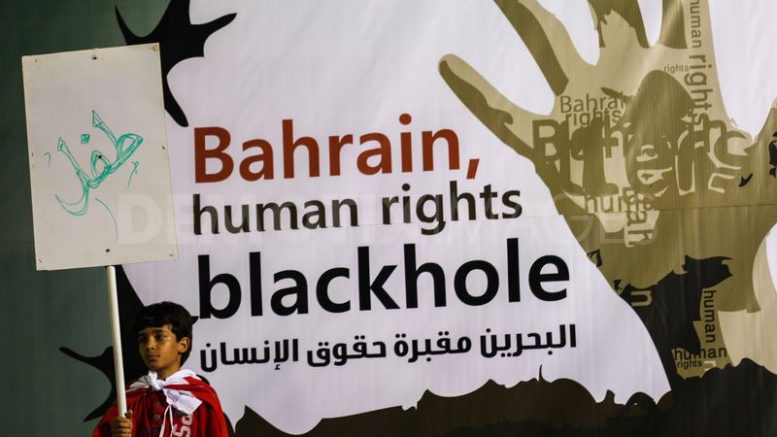This briefing has been prepared by SALAM for Democracy and Human Rights (SALAM DHR), an independent NGO that promotes human rights and democracy in the Gulf region and in Bahrain in particular.
Summary
Bahrain witnessed a deteriorating human rights situation in 2019, a continuation of repression that has been ongoing since the 2011 uprising, and which has been particularly severe since 2016.
This can be seen by the issues outlined below, including the ongoing imprisonment of leading civil society members, the use of torture and ill-treatment in prison and the carrying out of death sentences and executions against dissidents.
Due to international pressure, some small concessions have recently been enacted, including the restoring of citizenship of 551 individuals and the issuing of non-custodial sentences. But such policies have been incomplete and have coincided with other regressive measures.
As such, at this pivotal time, there is a need for the international community to stand up for human rights in Bahrain, including by openly and forcibly calling on the Bahraini government to:
- Immediately and unconditionally release all individuals detained for exercising their fundamental freedoms, and to drop all charges against them
- Conduct prompt, effective and credible investigations into all allegations of torture and hold perpetrators accountable
- Establish a moratorium on the use of the death penalty with the aim of working towards its abolition
Deteriorating human rights situation
The arbitrary arrest, prosecution and imprisonment of those exercising their right to freedom of expression, association and assembly
- Human rights defenders, political leaders, and civil society members are facing long-term prison sentences. There are currently estimated to be around 4000 political prisoners
- On 31 December 2018, the Court of Cassation upheld a five-year sentence against leading human rights defender Nabeel Rajab, arising from his social media activity
- On 28 January 2019, the Court of Cassation upheld the life sentence against Sheikh Ali Salman, leader of al-Wefaq, Bahrain’s largest but now-dissolved opposition political party
- Following the dissolvement of the secular-left National Democratic Action Society (Wa’ad) in 2017, all opposition political parties remain currently banned
The use of the death penalty
- Since Bahrain resumed the use of executions in January 2017 (after a seven-year absence), executing three activists, further death sentences have been passed
- In July 2019, the authorities executed three people, including two prisoners convicted in a mass trial marred by serious due process violations and allegations of torture
- Eleven death sentences were issued throughout 2019, and there are currently eight individuals at imminent risk of execution, awaiting only the King’s ratification
Torture and ill-treatment in prisons and detention centres
- Prisoners of conscience are commonly ill-treated and subjected to inhumane conditions, including being placed in solitary confinement
- Bahrain’s prison authorities are failing to provide adequate medical are to high-profile prisoners, some of whom are in critical condition, including opposition leader Hassan Mushaima
- On 15 August 2019, more than 600 prisoners in Jaw Prison and Dry Rock Detention Centre began a hunger strike to protest prison conditions, including the denial of medical care
Suppression of online and social media activity, including of dissidents abroad
- In 2019, Bahrain widened its suppression of online and social media activity. In May 2019, the Interior Ministry declared that it will prosecute people who follow “inciting accounts” or share such posts on Twitter
- Soon afterwards the Bahraini Ministry of Interior accused Germany-based activist and SALAM DHR Deputy Chairman Sayed Yousif Almuhafdha of cyber crimes that “provoke sedition among Bahraini society”, as well as other dissidents abroad
Small concessions
Restoration of citizenship
- 985 Bahrainis have been stripped of their citizenship since 2011, a policy which has been used as an instrument for the Bahraini government to punish dissidents and activists
- In April 2019, the King ordered the citizenship of 551 Bahrainis to be restored, bringing the number of those made stateless to 434. This move did not include hundreds political cases
Non-custodial (alternative) sentence legislation
- In May 2018, new legislation was implemented allowing alternative non-custodial sentencing to be issued. Yet non-custodial sentences were refused for human rights defender Nabeel Rajab (on 6 May and 17 September 2019) and scholar and activist Khalil al-Halwachi (23 July 2019)
- On 22 November 2019, the first political detainee was finally released under the alternative sentencing legislation, Sayed Mojtaba Al-Abbar
- On 15 December 2019, the Bahraini authorities released four Bahraini women as part of the law, including three sisters Amal, Iman and Fatima Ali
- Around 52 political detainees are believed to be suffering from serious health conditions


 العربية
العربية Français
Français Deutsch
Deutsch